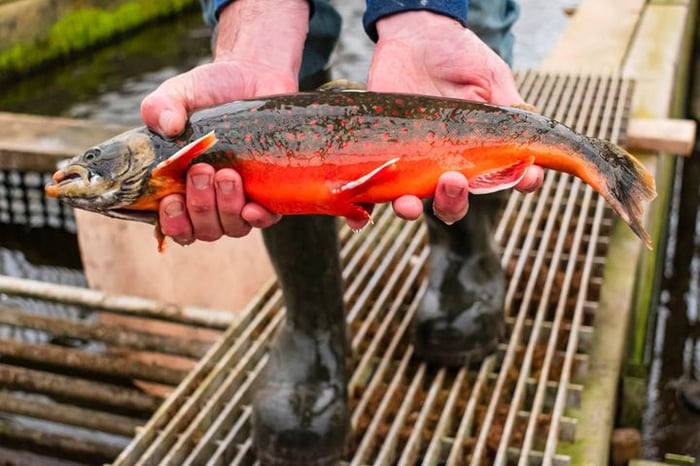We talk a lot about the where and how behind our food because the way that our food makes it to our plates has a significant ripple effect that impacts not only our planet, but also our economy, and our community. Fewer industries is this more true than in the fishing industry.
Springhills Fish, one of our newer producers, is a second-generation fish farming business in Ontario that raises rainbow trout, coho salmon, and Arctic char at several farms in Grey County. This small-scale farm puts a lot of emphasis on ethical and humane growing methods to ensure that the way they farm their fish has the fish, the planet and the community top of mind.
In this blog post, we're going to dive deeper into Springhill's Fish Farm to give you more insight into what makes this producer, whose products are now available through 100km Foods, so special.
Springhills is A TRUE FAMILY AFFAIR
Siblings RJ and Arlen Taylor both left their family fish farm in Hanover, Ontario when they turned 18, swearing they would never follow the path of their parents and become fish farmers.
For a while, they stayed true to this. Arlen went on to do international development in Angola and Iraq while RJ led science outreach initiatives for several large research centers in the city.
But, as the family business grew to include a few more farms and customers, Arlen and RJ saw that there started to be room for both of them to bring back the expertise they learned in their careers - Arlen's in operations and animal health and RJ's background in communication, sales, and finance - to the farm and so they both entered the family business.
Since going back five years ago, RJ says he hasn't regretted it for a second, stating that farmers are some of the most progressive and eco-focused people he knows!
Both Arlen and RJ just wanted to keep growing the family business and have fun along the way. Arlen is motivated by the animals and fish health, her husband Mike by building and tinkering, and RJ by getting to grow and talk about sustainable food. They have an incredible team of 24 staff, many of which are married or related, that work hard and play hard with them!
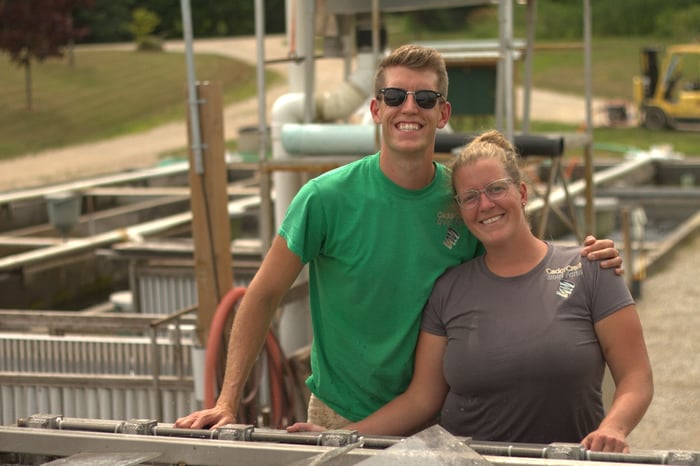
NAVIGATING THE MURKY WATERS OF "SUSTAINABLE SEAFOOD"
It is no secret that the seafood industry is rampant with mislabelling and false claims. This makes it difficult to know exactly what to look for when sourcing these products to be confident that the seafood you're getting is coming from where it says it's from and harvested how it says it was harvested.
For instance, Oceana Canada found 44% of fish in Canadian stores and restaurants had the wrong species on the label. And that statistic doesn’t count those with false labels like “local”, “sustainable” or “wild” when they aren’t.
Sometimes folks disregard farmed fish because of stories they hear about mismanaged farms abroad.
But at Springhills, they find asking “farmed or wild” is not a useful question when you’re trying to make a good decision for taste, your health, or the planet.
That’s because there are wild fish (more than you think) that carry toxins from what’s in the water. They can have mediocre taste or texture from how their caught. And have questionable environmental or human rights records.
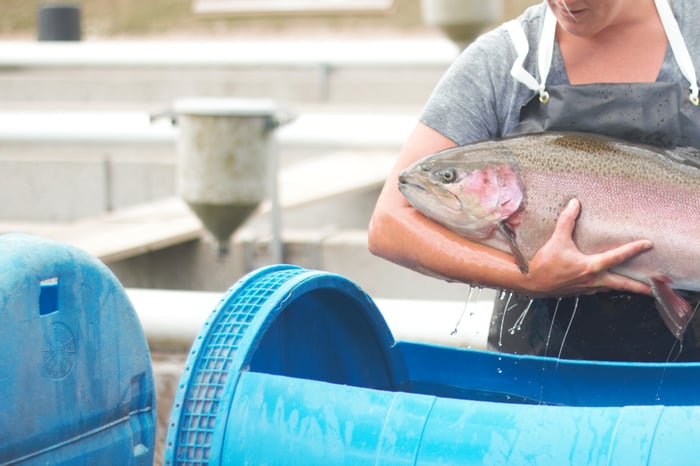
But other wild fish are safe to eat, taste great, and are from well-managed fisheries. There are also fish farms that aren’t good, damage ecosystems, or produce fish that tastes poor.
But then there are also many farmers who raise fish with ethical, humane and eco-friendly methods.
Instead of asking “farmed vs wild”, we suggest asking “is it eco-certified?” and also “is it local?”.⠀
Buying local keeps you away from a complex international supply chains known to mislabel and hide untrustworthy practices.
Eco-certifications like Best Aquaculture Practices (BAP), Marine Stewardship Council (MSC) and Aquaculture Stewardship Council (ASC) show that your fish was raised in a way that’s good for the fish, safe to eat, and stewards the planet. When you see BAP and MSC certifications, it means that the farm or the fisher had an auditor on site every year to make sure they were operating in the best interests of fish welfare, the planet, their staff and community.
These certifciations also prove the fish is fully traceable, which means there is a complete record of where that fish came from and everything that happened in its life and harvest. With the often murky waters of "sustainale seafood", this transparency can give consumers peace of mind knowing that their fish is coming from where the label says it's coming from, from a businesses that operates with holistically sustainable practices.
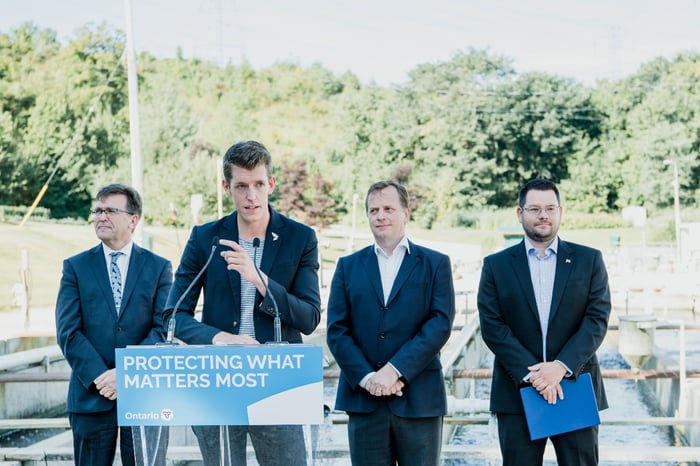
There are also other good labels such as Ocean Wise (which Springhills is also recommended by) and Seafood Watch that do thorough examinations of different industries and geographic areas, but they aren’t the same farm-by-farm audits we see with those above.
Springhills is the only land-based farm in central Canada that is eco-certified by Best Aquaculture Practices (BAP). It took them four years to prepare for their first audit two years ago. The program is voluntary and much stricter than our government requirements, but Springhill does it to show their customers that they hold themselves to the highest international standard for sustainability. Part of being BAP-certified also means that they can only use special fish feed from BAP-certified mills, which is just another reason Springhills fish are good for you, and good for the planet!
Over the decades of their experience fish farming, they’ve learned that when you do good by the fish and the environment, the product always, always tastes better at the end.
SPRINGHILL FISH PROVENANCE
Springhill raises fish on their own fish farm in Grey County as well as sourcing a few varieties of fish from other farms who share their values and ethos. The following fish are available from Springhills through 100km Foods:
- Rainbow Trout: Mild nut-like flavour similar to salmon. Raised on Springhills family eco-farms in Grey County with plenty of fresh water, low densities and sustainable diets.
- Arctic Char: Lighter and sweeter flavour than it’s cousins, trout and salmon. Grows in colder water giving it a thick skin perfect for barbecuing or frying. Raised on Springhills family eco-farms in Grey County with plenty of fresh water, low densities and sustainable diets.
- Pickerel: Light succulent flavour with a flaky texture. One of the most sought after freshwater fish in North America. Caught by independent fishermen and women in Lake Erie. A wild fishery recognized as sustainable by the Marine Stewardship Council, which means it’s good for the environment and safe to eat.
- Barramundi: Clean buttery flavour and meaty texture that appeals to everyone, even non-fish eaters. Raised at Sandplains Aquaculture, which is an indoor tropical fish farm in Mossley, Ontario. They raise barramundi in a closed-loop system that filters and recirculates all their water.
- Atlantic Salmon: Mild-flavoured with rich taste. Raised in Cape Breton, Nova Scotia by a land-based farm called Sustainable Blue. They raise fish in a similar manner to Springhills with plenty of fresh water, low densities and eco-diets.
- Coho Salmon: Farmed at Springhills, newly available!
Springhills' FISH PRODUCTION PROCESS
Springhills raises rainbow trout, Arctic char and coho salmon at their small land-based farms in Grey County.
For most of their 30-year history, Springhills were primarily the hatcheries growing the juvenile fish for other farms. Since the pandemic, they’ve been raising fish to market size and processing them themselves. According to co-owner RJ, "it’s been incredible validation that taking care of the fish in life and death is not only the right thing to do, but it also creates a better tasting product!"
The amazing thing about Springhills raising the fish themselves is the level of control they have over virtually everything in the production process, which means they can ensure a consistent quality and great taste of their products.
They control the water quality, what the fish eat, how they live and are handled, and just as importantly, how they’re humanely harvested.
They take special care for animal welfare (Arlen actually helped write Canada’s farmed fish welfare code!) which includes lower densities, plenty of fresh water, and they even offer enrichment like water sprayers that calm and exercise their fish.
-1.jpg?width=700&name=Springhills%20Trout%20Farm%20(1)-1.jpg)
Springhills also utilizes a unique and humane harvesting technique for their fish, which involves electrostunning them immediately before processing. This really adds firmness and freshness to the fish because they don't have any chance to degrade or go through rigor mortis.
Fresh Doesn't Mean Not Frozen
Now, let's quickly talk about the f-word: frozen.
Springhills Fish, similar to our Fogo products, all come as frozen fillets. But, frozen does not mean this product is not fresh. On the contrary, fish like Springhills that is frozen at the peak of freshness, within hours of harvest, is actually more fresh than a lot of fish that you could get your hands on that is not frozen or "fresh". Springhills freezes all their fish for a very simple reason: because it guarantees the product’s freshness and firmness.
Good quality frozen fish has everything to do with when you freeze it. Because Springhills is a small producer, they can bring their fish live to their plant and ensure it is humanely harvested, filleted, vac-packed and in the blast freezer in less than 5 hours.
We've received so much positive feedback so far from our customers about how fresh Springhill Fish tastes, and that's because it is.
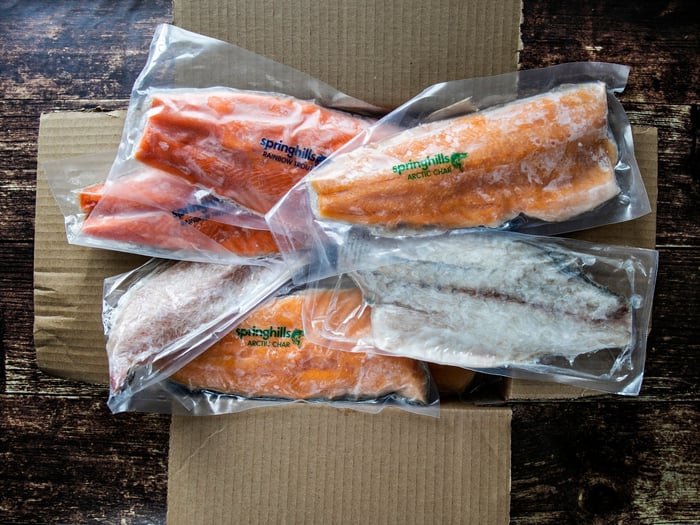
YOUR IMPACT
When chefs choose Springhills' fish, they’re supporting a second-generation family farm who is trying to do things right.
Chefs have an incredible opportunity to tell the story of local food. People listen to you, trust your recommendations, and get inspired by what’s on your menus.
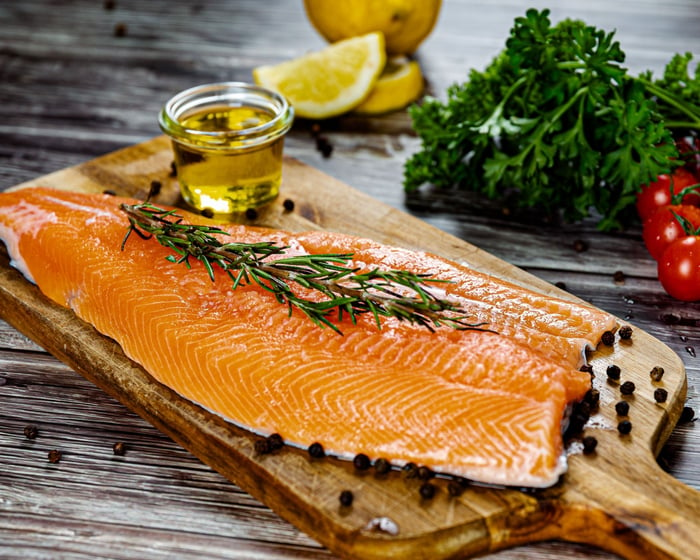
When you work with local producers like Springhills, you have the unique opportunity to go visit their farm and verify everything they're saying they do — which can be hard if your suppliers are an ocean away. Plus we can get it to them faster and fresher, and there’s very little chance for major supply chain breakdowns with such a short chain.
LEARN MORE ABOUT SPRINGHILL FARMS
Check out Springhills socials for more about how they raise their eco-friendly fish here in Ontario ‘tackling’ things like “Are farmed fish dyed orange”, “where does the water from a fish farm go”, and “More wild fish are stocked from farms than you think”!
